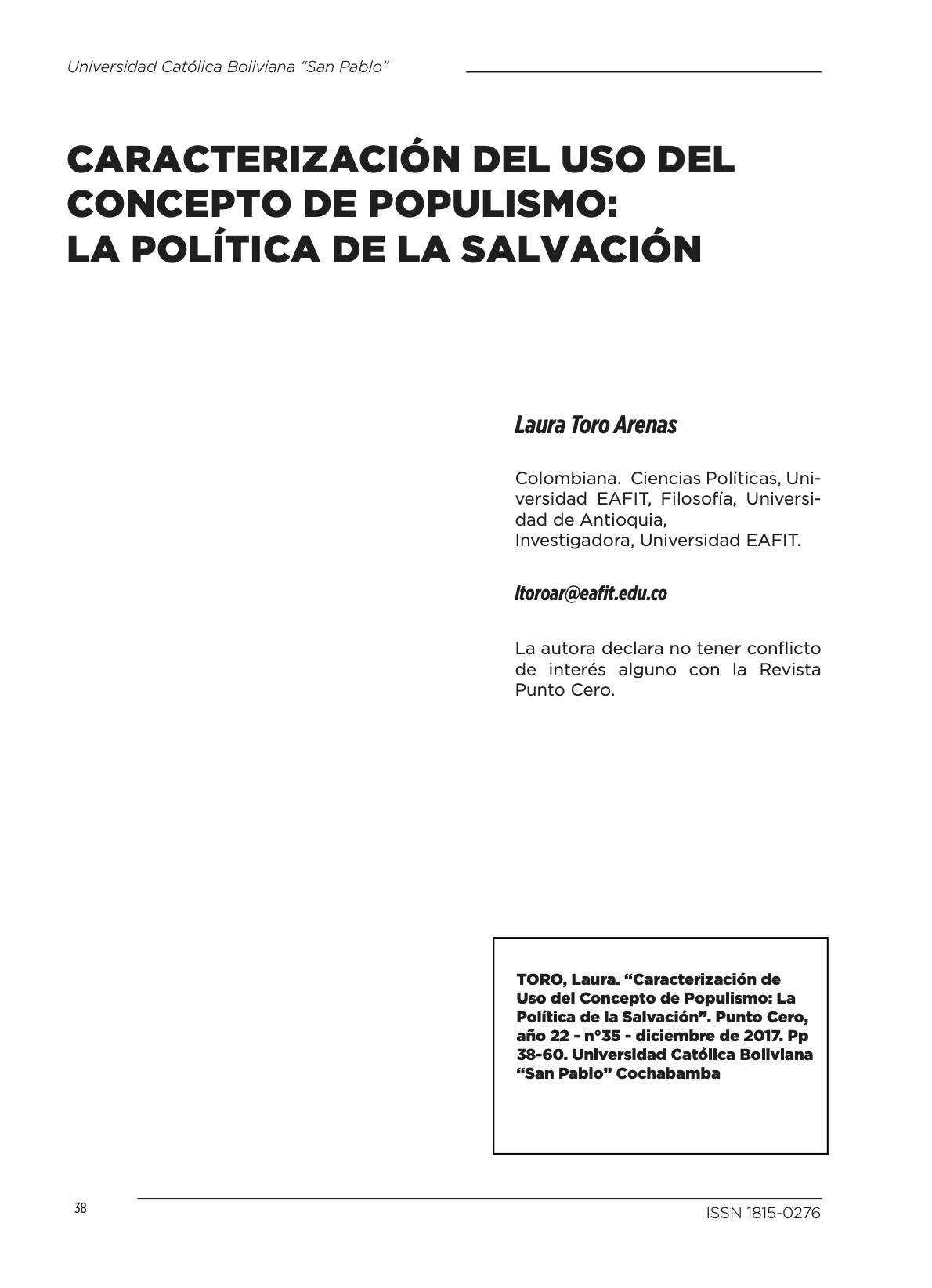Characterization of the use of the concept of populism: The politics of salvation
DOI:
https://doi.org/10.35319/puntocero.20173556Keywords:
Political Communication, Religion, Conceptualization, CognitionAbstract
In this article, a multilevel conceptual mechanism is proposed to characterize the way in which the concept of populism is used. It is pointed out that this is a complex concept that must be defined through different analytical levels and that the main distinguishing feature of this category in comparison to other phenomena lies in the use of the idealized cognitive model of the figure of salvation, where political reality is narrated in terms of an apocalyptic scenario that uses the commonplaces of democracy. In this sense, the core of the narrative that makes meaningful the category of populism is a metaphor that is based on a religious correlate. This mechanism aims to overcome a part of the theoretical and methodological difficulties of the conceptualization of populism and to explain some components involved in the categorization of political phenomena. To make this, there is made a contextualization of the discussion on the concept, are studied some insufficiencies of the conceptualizations and is proposed a theoretical framework that explains these insufficiencies.
References
ARDITI, Benjamín. 2004. “El populismo como espectro de la democracia: una respuesta a Canovan”. Revista Mexicana de Ciencias Políticas y Sociales 47 (mayoagosto): 86.
BUENO, Gildardo. 2013. “El populismo como concepto en América Latina y en Colombia”. Estudios Políticos 42: 112.
CERUTTI, Horacio. 2003. Conceptos y fenómenos fundamentales de nuestro tiempo Populismo. México: Universidad Nacional Autónoma De México
CHARAUDEAU, Patrick. 2009. Reflexiones para el análisis del discurso populista. Discurso & Sociedad 3(2) (junio): 253.
CONNOLLY, William. 1993. The terms of political discourse. Nueva Jersey: Princeton University Press.
DE SOUZA Galvao et Al. 1998. Diccionário de Política. Sao Paulo.
EVANS, Vyvyan y Green, Melanie. 2006. Cognitive linguistics: An introduction. Gran Bretaña: Edinburgh University Press.
FAIRCLOUGH, Isabel y Fairclough, Norman. 2012. Political discourse analysis: A method for advanced students. Londrés: Routledge.
GALLIE, Walter. 1998. “Conceptos esencialmente impugnados”. Cuadernos de crítica 49.
GREEN, William. 2013. Gaitanismo, liberalismo de izquierda y movilización popular. Medellín: Fondo editorial universidad EAFIT.
HERMET, Guy. 2003. “El populismo como concepto”. Revista de ciencia política 23(1): 5.
KAISER, Alex y Álvarez, Gloria. 2016. El engaño populista: por qué se arruinan nuestros países y cómo rescatarlos. Barcelona: Ediciones Deusto.
LACLAU, Ernesto. 2005. La razón populista. Buenos Aires: Fondo de cultura económica.
LAKOFF, George y Johnson, Mark. 1980. Metáforas de la vida cotidiana. Madrid: Cátedra.
LAKOFF, George y Johnson, Mark. 1986. Women, fire, and Dangerous Things. What categories Reveal about the mind. Chicago: University of Chicago Press.
LEE TUVESON, Ernest. 1968. Redeemer nation: The idea of America’s millennial role. Chicago: University of Chicago Press.
MARINGONI, Gilberto. 2010. ¿Cuál es el tipo de liderazgo de Chávez?. En Hugo Chávez: una década en el poder, coords. Francesca Ramos, Carlos Romero y Hugo Eduardo Ramírez. Editorial. Bogotá: Universidad del Rosario.
MCRAE, Donald. 1969. Populism as an ideology. En Populism. Its Meanings and National Characteristics, coords. Gellner, Ernest, y Ionescu, Ghita. Londrés: Weidenfeld and Nicolson.
MELO, Julián. 2014. “Los tiempos del populismo. Devenir de una categoría polisémica”. Colombia Internacional 82: 71.
MUDDE, Cas y Rovira, Cristóbal. 2017. Populism: A Very Short Introduction. Oxford: Oxford University Press.
ROITMAN, Marcos. 2008. Pensar América Latina. El desarrollo de la sociología latinoamericana. Buenos Aires: CLACSO.
SARTORI, Giovanni. 2012. Cómo hacer ciencia política. Barcelona: Taurus.
SCHAMIS, Héctor. 2014. “Populismo; Un término en busca de su significado”. El País. 18 de octubre. Tribuna (opinión).
VARGAS, Getúlio. 1954. Carta- Testamento. Río de Janeiro.
VOGEL, Steffen. 2016. “La tentación autoritaria: La nueva izquierda europea: entre el resurgimiento y el populismo”. Nueva Sociedad 261 (enero-febrero): 139.
WEBER, Max. 2012. Sociología de la religión: Madrid: Ediciones AKAL.
WEYLAND, Kurt. 2001. “Clarifying a contested concept: Populism in the study of Latin American politics”. Comparative politics 34 (1) (Diciembre): 1.
WILES Peter. 1969. A syndrome not a doctrine: some elementary thesis on populism. En Populism. Its Meanings and National Characteristics, cords. Gellner, Ernest., y Ionescu, Ghita. Londrés: Weidenfeld and Nicolson
ZANATTA, Loris. 2014. Populismo. Buenos Aires: Katz

Downloads
Published
How to Cite
Issue
Section
License
Copyright (c) 2017 Revista Punto Cero

This work is licensed under a Creative Commons Attribution-NonCommercial 4.0 International License.








